Related Research Articles

Pedro Gutiérrez de Valdivia or Valdiva was a Spanish conquistador and the first royal governor of Chile. After serving with the Spanish army in Italy and Flanders, he was sent to South America in 1534, where he served as lieutenant under Francisco Pizarro in Peru, acting as his second in command.
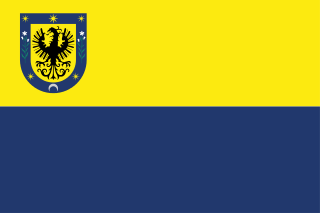
Concepción is a city and commune in south-central Chile, and the geographical and demographic core of the Greater Concepción metropolitan area, one of the three major conurbations in the country. It has a significant impact on domestic trade being part of the most heavily industrialized region in the country. It is the seat of the Concepción Province and the capital of the Bío Bío Region. It sits about 500 km south of the nation's capital, Santiago.
Chilean music refers to all kinds of music developed in Chile, or by Chileans in other countries, from the arrival of the Spanish conquistadors to the modern day. It also includes the native pre-Columbian music from what is today Chilean territory.
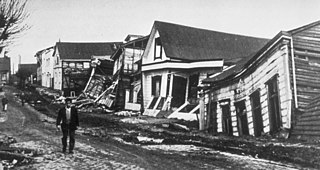
The 1960 Valdivia earthquake and tsunami or the Great Chilean earthquake on 22 May 1960 was the most powerful earthquake ever recorded. Most studies have placed it at 9.4–9.6 on the moment magnitude scale, while some studies have placed the magnitude lower than 9.4. It occurred in the afternoon, and lasted 10 minutes. The resulting tsunamis affected southern Chile, Hawaii, Japan, the Philippines, eastern New Zealand, southeast Australia, and the Aleutian Islands.
Chilean rock is rock music and its corresponding subgenres produced in Chile or by Chileans. Chilean rock lyrics are usually sung in Spanish so can be considered as part of rock en español, although they are sometimes sung in English as well.

Austral University of Chile is a Chilean research university based primarily in Valdivia, with satellite campuses in Puerto Montt and Coyhaique. Founded on September 7, 1954, it is one of the eight original Chilean Traditional Universities. It operates as a nonprofit self-owned corporation under private law, and receives significant state-funding.

Los Prisioneros were a Chilean rock band formed in San Miguel, Santiago, in 1982. Considered one of the most important Latin-American bands of all time, they've been evaluated as pioneers of Rock en español by Latin American media and musicians, and as the band with the strongest socio-political impact in Chile. The group would develop a new wave sound that would have its roots in British punk rock, in particular The Clash, and would incorporate rockabilly, reggae and ska influences, and later on synthpop, and would make themselves known for their controversial, witty and subversive lyricism that criticized the socio-economic structures, education and societal attitudes of dictatorship-era Chile and Latin America as a whole. This would cause their music to be banned by the Chilean mainstream media between 1985 and 1990, but their music would continue to spread there, aided by word of mouth and shared homemade cassette tapes.
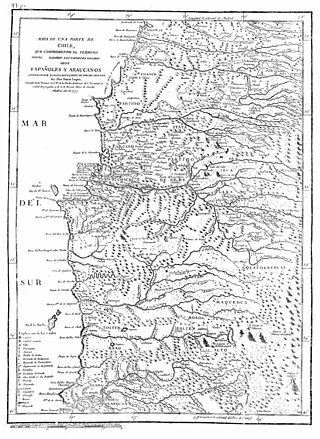
The Arauco War was a long-running conflict between colonial Spaniards and the Mapuche people, mostly fought in the Araucanía region of Chile. The conflict began at first as a reaction to the Spanish conquerors attempting to establish cities and force Mapuches into servitude. It subsequently evolved over time into phases comprising drawn-out sieges, slave-hunting expeditions, pillaging raids, punitive expeditions, and renewed Spanish attempts to secure lost territories. Abduction of women and war rape was common on both sides.

The General Captaincy of Chile, Governorate of Chile, or Kingdom of Chile, was a territory of the Spanish Empire from 1541 to 1818 that was, initially, part of the Viceroyalty of Peru. It comprised most of modern-day Chile and southern parts of Argentina in the Patagonia region. Its capital was Santiago de Chile. In 1810 it declared itself independent, with the Spanish reconquering the territory in 1814, but in 1818 it gained independence as the Republic of Chile. It had a number of Spanish governors over its long history and several kings.

The Los Ríos Region is one of Chile's 16 regions, the country's first-order administrative divisions. Its capital is Valdivia. It began to operate as a region on October 2, 2007, having been created by subdividing the Los Lagos Region in southern Chile. It consists of two provinces: Valdivia and the newly created Ranco Province, which was formerly part of Valdivia Province.

Valdivia is a city and commune in southern Chile, administered by the Municipality of Valdivia. The city is named after its founder, Pedro de Valdivia, and is located at the confluence of the Calle-Calle, Valdivia, and Cau-Cau Rivers, approximately 15 km (9 mi) east of the coastal towns of Corral and Niebla. Since October 2007, Valdivia has been the capital of Los Ríos Region and is also the capital of Valdivia Province. The national census of 2017 recorded the commune of Valdivia as having 166,080 inhabitants (Valdivianos), of whom 150,048 were living in the city. The main economic activities of Valdivia include tourism, wood pulp manufacturing, forestry, metallurgy, and beer production. The city is also the home of the Austral University of Chile, founded in 1954 and the Centro de Estudios Científicos.
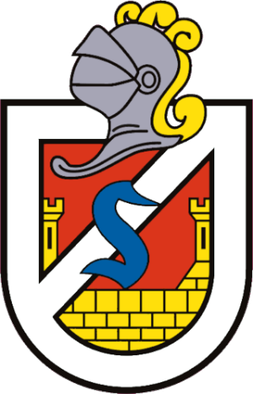
Club de Deportes La Serena S.A.D.P., is a Chilean football club based in the city of La Serena, Coquimbo Region. The club was founded 9 December 1955 and plays in the second division of the Chilean football league. Their home games are played at the La Portada stadium, which has a capacity of 18,254 seats. Their biggest rival is Coquimbo Unido. They are nicknamed "Gigante de La Cuarta", because of the Copa Chile they won back in the 1960, being the only club in the region that has this trophy

O'Higgins Fútbol Club, also known as O'Higgins de Rancagua, is a Chilean professional football club based in Rancagua, that currently plays in the Campeonato Nacional. The club's home stadium is Estadio El Teniente, opened in 1945 and renovated for the 2015 Copa América, which was hosted by Chile.
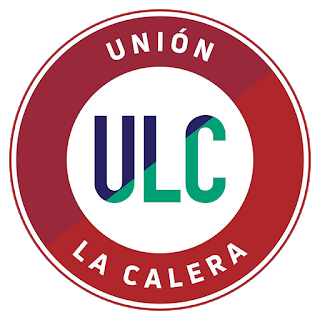
Unión La Calera is a Chilean football club based in La Calera and competes the Primera División de Chile.
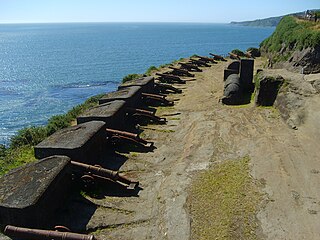
The Fort System of Valdivia is a series of Spanish colonial fortifications at Corral Bay, Valdivia and Cruces River established to protect the city of Valdivia, in southern Chile. During the period of Spanish rule (1645–1820), it was one of the biggest systems of fortification in the Americas. It was also a major supply source for Spanish ships that crossed the Strait of Magellan.
German Chileans are Chileans descended from German immigrants, about 30,000 of whom arrived in Chile between 1846 and 1914. Most of these were from Bavaria, Baden and the Rhineland, and also from Bohemia in present-day Czech Republic, which were traditionally Catholic. A smaller number of Lutherans immigrated to Chile following the failed revolutions of 1848.

Los Ángeles Negros are a Chilean pop ballad band formed in San Carlos de Chile in 1968. The band's best-known line-up consisted of singer Germaín de la Fuente, guitarist Mario Gutiérrez, keyboardist Jorge González, bassist Miguel Ángel "Nano" Concha, and drummer Luis Ortiz. Their music is a blend of boleros, psychedelic funk and rock music, known as Balada rockmántica.

The Conquest of Chile is a period in Chilean historiography that starts with the arrival of Pedro de Valdivia to Chile in 1541 and ends with the death of Martín García Óñez de Loyola in the Battle of Curalaba in 1598, and the destruction of the Seven Cities in 1598–1604 in the Araucanía region.

The Maritime history of Chile started when Chile gained independence, but traces it origin in the colonial era and has ultimately origin in the seafaring tradition of the Iberian Peninsula, Europe and the Mediterranean as well as from indigenous peoples of Chile.
Sonora Palacios is one of Chile's oldest tropical orchestras. Formed in the early 1960s, the group is one of the main exponents of Chilean cumbia and were pioneers of the style. They were the first Chilean band to record cumbia and are widely recognized for establishing the popularity of cumbia in Chile.
References
- 1 2 3 Sexual Democracia. Allmusic. Retrieved 2012-05-27.
- ↑ Multimedia Club Depotivo Valdivia